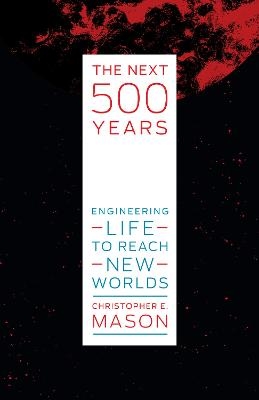
The Next 500 Years
Engineering Life to Reach New Worlds
Seiten
2021
MIT Press (Verlag)
978-0-262-04440-0 (ISBN)
MIT Press (Verlag)
978-0-262-04440-0 (ISBN)
- Titel ist leider vergriffen;
keine Neuauflage - Artikel merken
"Driven by a vision of colonizing other planets, Mason reveals unique insights into how the human body is altered during long-duration spaceflight & how genetic engineering can protect cells in space"--
An argument that we have a moral duty to colonize other planets and solar systems--because human life on Earth has an expiration date. Inevitably, life on Earth will come to an end, whether by climate disaster, or by cataclysmic war, or when the sun runs out of fuel in a few billion years. To avoid extinction, will we have to find a new home planet, perhaps even a new solar system, to inhabit? In this provocative and fascinating book, Christopher Mason argues that we have a moral duty to do just that. Because we are the only species aware that life on Earth has an expiration date, we have a responsibility to act as the shepherd of lifeforms--not only for our species but for all species on which we depend and for those still to come (by accidental or designed evolution). Mason argues that the same capacity for ingenuity that has enabled us to build rockets and land on other planets can be applied to redesigning biology so that we can sustainably inhabit those planets. And he lays out a 500-year plan for undertaking the massively ambitious project of reengineering human genetics for life in other worlds.
An argument that we have a moral duty to colonize other planets and solar systems--because human life on Earth has an expiration date. Inevitably, life on Earth will come to an end, whether by climate disaster, or by cataclysmic war, or when the sun runs out of fuel in a few billion years. To avoid extinction, will we have to find a new home planet, perhaps even a new solar system, to inhabit? In this provocative and fascinating book, Christopher Mason argues that we have a moral duty to do just that. Because we are the only species aware that life on Earth has an expiration date, we have a responsibility to act as the shepherd of lifeforms--not only for our species but for all species on which we depend and for those still to come (by accidental or designed evolution). Mason argues that the same capacity for ingenuity that has enabled us to build rockets and land on other planets can be applied to redesigning biology so that we can sustainably inhabit those planets. And he lays out a 500-year plan for undertaking the massively ambitious project of reengineering human genetics for life in other worlds.
Christopher E. Mason is a geneticist and computational biologist who has been a Principal Investigator and Co-investigator of seven NASA missions and projects. He is Associate Professor at Weill Cornell Medicine, with affiliate appointments at the Meyer Cancer Center, Memorial Sloan Kettering Cancer Center, and the Consortium for Space Genetics at Harvard Medical School.
| Erscheinungsdatum | 23.04.2021 |
|---|---|
| Sprache | englisch |
| Maße | 137 x 203 mm |
| Themenwelt | Naturwissenschaften ► Biologie ► Genetik / Molekularbiologie |
| ISBN-10 | 0-262-04440-4 / 0262044404 |
| ISBN-13 | 978-0-262-04440-0 / 9780262044400 |
| Zustand | Neuware |
| Informationen gemäß Produktsicherheitsverordnung (GPSR) | |
| Haben Sie eine Frage zum Produkt? |
Mehr entdecken
aus dem Bereich
aus dem Bereich
50 Meilensteine der Genetik
Buch | Hardcover (2022)
Librero b.v. (Verlag)
CHF 13,90


